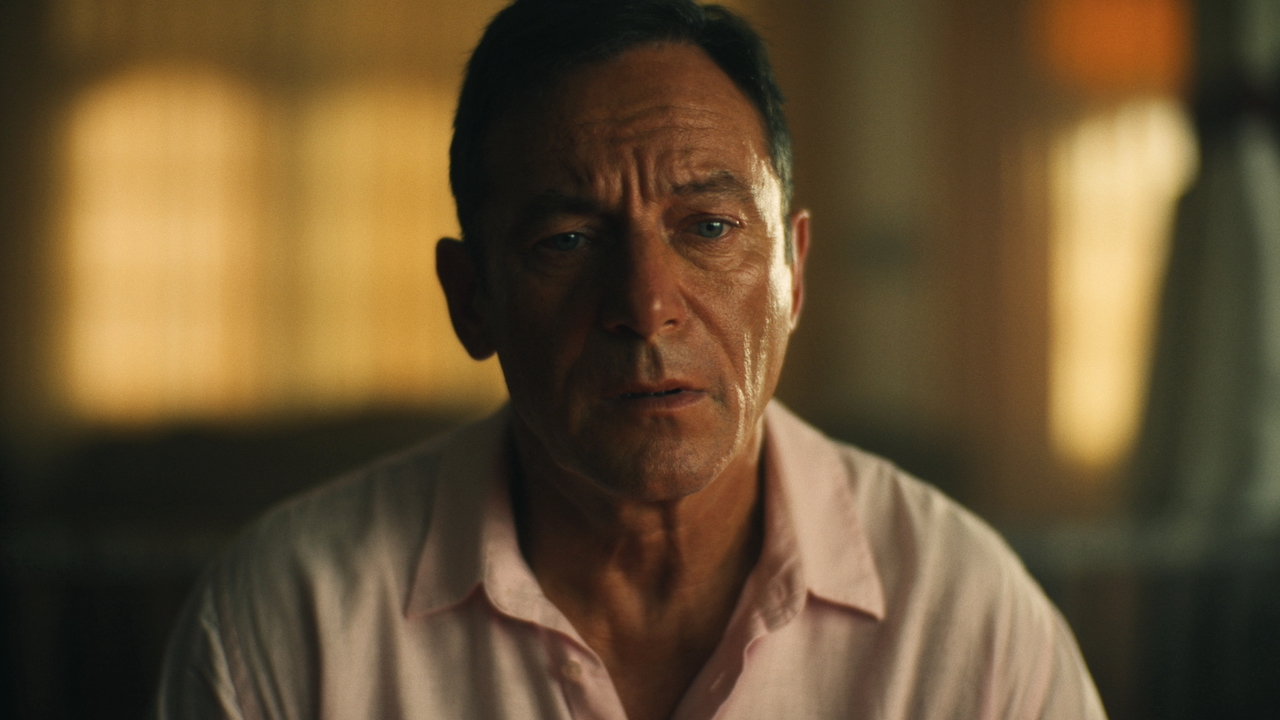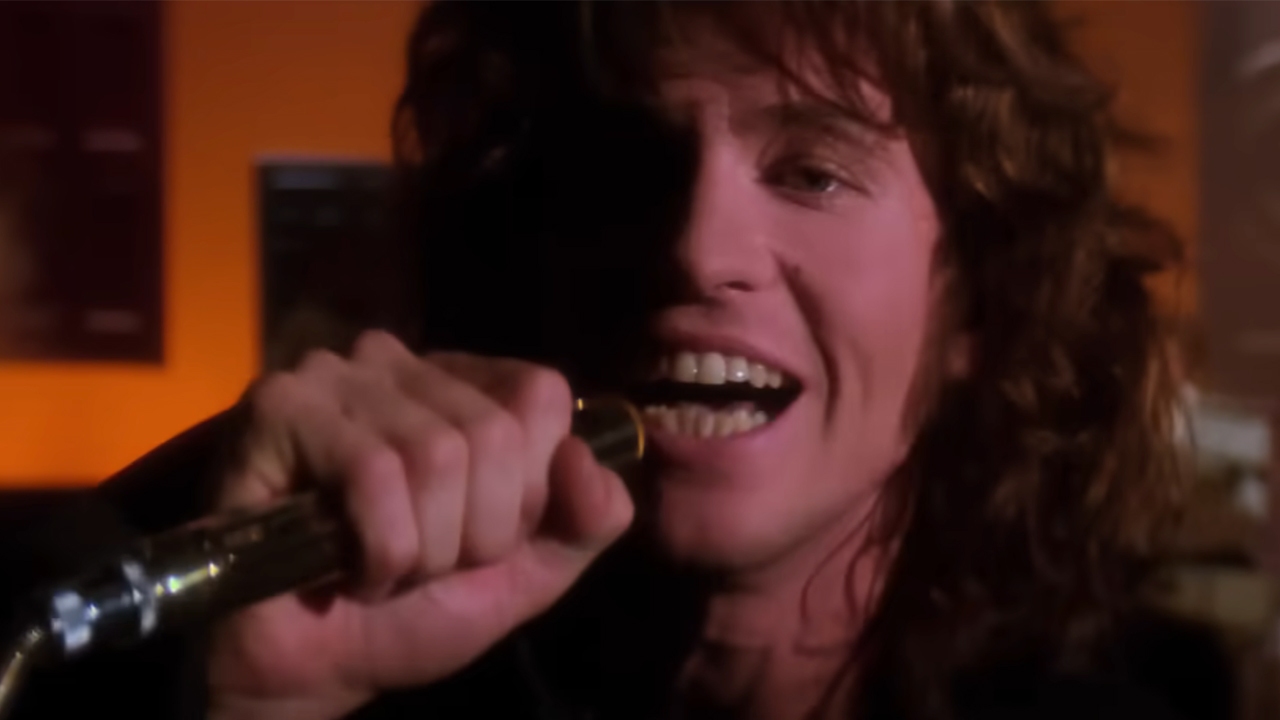Adapting Stephen King's Desperation: Ron Perlman Is A Terror In The Faithful 2006 TV Movie
Tak!
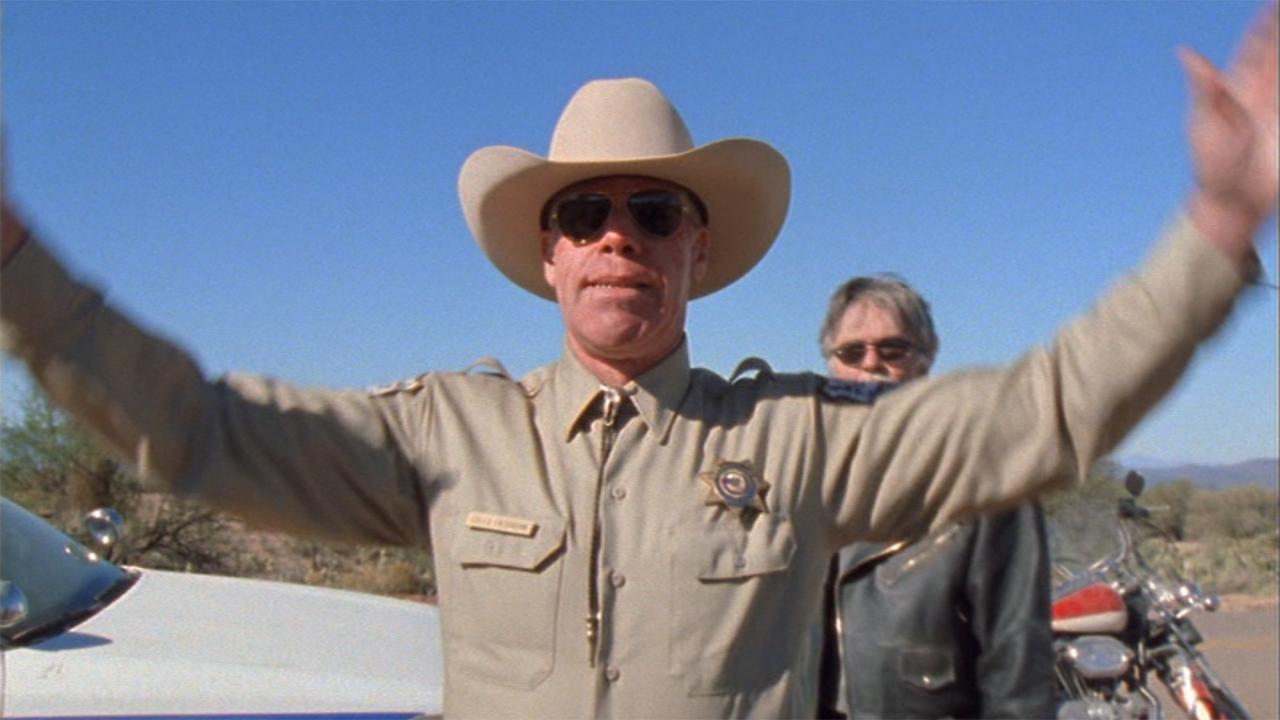
Mick Garris’ Desperation, an adaptation of the Stephen King book of the same name written by the author, aired on ABC as a TV movie in the summer of 2006… but that was not at all the plan that the filmmakers had in mind for it when it first went into development. Not only was it a production that spent nearly a full decade trying to go from concept to finished product, but it underwent a medium change during the long wait as well.
The project was one of two adaptations that began their Hollywood journey on the set of the 1997 miniseries remake of The Shining (also written by King and directed by Garris) – but while Frank Darabont’s pitch for The Green Mile quickly got traction at Castle Rock and was made into a feature film that hit theaters in 2001, Desperation’s path toward release was a lot rockier. The book was brand new at the time (it hit stores in September 1996), and initially, the idea was for King and Garris to make it as a theatrically released follow-up to The Shining. Unfortunately, Hollywood trends ended up providing a roadblock.
According to Mick Garris on Desperation’s DVD commentary, Stephen King sold his script to New Line Cinema, but it hit a wall following the blockbuster success of Wes Craven’s Scream. The studio balked at the idea of making a straight horror feature while witnessing the demand for what Garris calls, “self-reflective, nudge, nudge, wink, wink, teenage horror movie spoofs,” and the project went on the backburner. It wasn’t until years later – after the men collaborated on the 2004 super flop Riding The Bullet – that ABC convinced them to rework King’s screenplay as a teleplay, and what was going to be a big screen film was turned into a TV movie.
The issues didn’t stop there, as while filming wrapped in January 2005, a slow postproduction period resulted in the movie missing sweeps and getting delayed more than a year. By the time it did reach broadcast, ABC made the decision to air it up against the Season 4 finals of American Idol – a call that made Stephen King decidedly “bitter” – and while the reality show brought in over 30 million viewers (according to Scott van Doviak’s Stephen King Films FAQ), Desperation had an audience of only 7.5 million.
At the time, Stephen King called Desperation “probably the best TV movie to be made from my work,” but is that a statement that has withstood the test of time? That’s the question that's front and center of mind as we dig into this week’s edition of Adapting Stephen King.
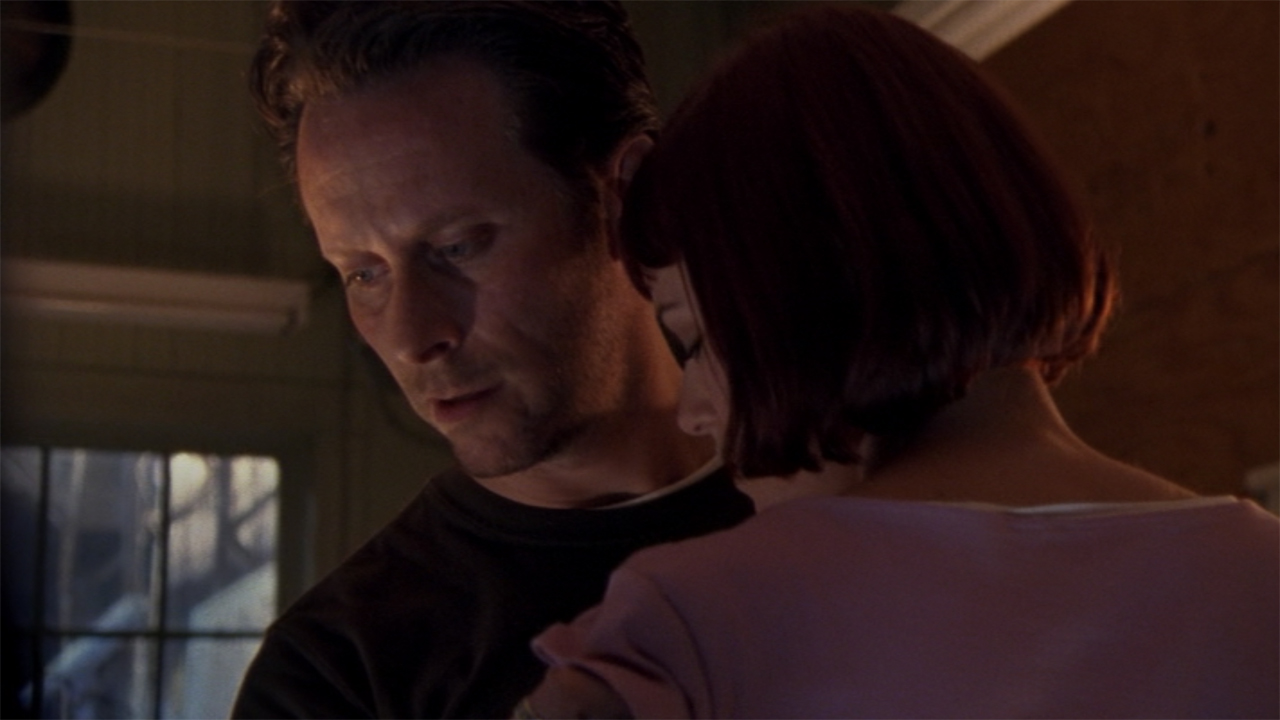
What Desperation Is About
Stephen King obviously understands the horror potential in isolated places. Salem’s Lot was inspired by the idea of a secluded Maine town being quietly annihilated. The Shining traps its characters alone in a Rocky Mountain hotel. “Children Of The Corn” drops its East coast protagonists into the vast emptiness of Nebraska. There are many more examples of this in the King canon – and Desperation is very much a part of that group.
The novel’s origins are documented on the author’s official website, and note that the idea for the story was born in 1991 when Stephen King was driving across the United States in his daughter’s car. While making his way through Nevada, he came upon a seemingly empty town called Ruth, and two thoughts instantly sprung to mind: “They’re all dead” and “Who killed them?” The answer he conjured was that the local sheriff had gone on some kind of homicidal rampage – and with that he started to come up with Desperation’s monstrous antagonist, Collie Entragian.
CINEMABLEND NEWSLETTER
Your Daily Blend of Entertainment News
Years later (in 1994, to be precise), Stephen King opted to do the promotional tour for his book Insomnia by traveling across the country on his motorcycle… and that particular adventure ended up informing John Edward Marinville, one of Desperation’s key protagonists.
With the setting and characters conceptualized, King developed a story utilizing a theme that is present in a number of works: the nature of a benevolent or malevolent God. Much like what the writer did with The Stand (which is a story that sees holy good at work through the hands of Mother Abigail Freemantle, Stuart Redman, Frannie Goldsmith, Glen Bateman, and more), Desperation argues there is no savior or any simple solutions that come through faith. In a 2009 interview with Time Magazine, Stephen King explained,
I was raised in a religious household, and I really wanted to give God his due in this book. So often, in novels of the supernatural, God is a sort of kryptonite substance, or like holy water to a vampire. You just bring on God, and you say ‘in his name,’ and the evil thing disappears. But God as a real force in human lives is a lot more complex than that. And I wanted to say that in Desperation. God doesn’t always let the good guys win… It’s possible to be in pain and still believe that there is some force for good in the universe.
Operating in contrast to that “force for good in the universe” in the novel is Collie Entragian – a police officer in Desperation, Nevada. Not simply a psychotic, homicidal individual, Entragian is possessed by an evil entity known as Tak that has managed to escape from the local mine (known as the China Pit). After killing just about everybody locally, it begins to detain innocent strangers who simply make the mistake of driving near the town on US Highway 50.
At the start of the book, six strangers find themselves locked up in the Desperation police department. This includes the John Edward Marinville (a popular author), Mary Jackson (whose husband, Peter, is also killed by Entragian), Tom Billingsley (the town’s veterinarian), and the Carver family (including parents Ralph and Ellen, and their son David). The possessed cop has unspecified plans for them, but they know they have to escape before they are killed.
Working from the outside to help is Stephen Ames (John Marinville’s assistant) and Cynthia Smith (a hitchhiker), who figure out that John is in trouble when the former gets a scrambled distressed call – but also important in the mix is the powerful faith of young David, who has been divinely inspired after his best friend survives a near-fatal accident.
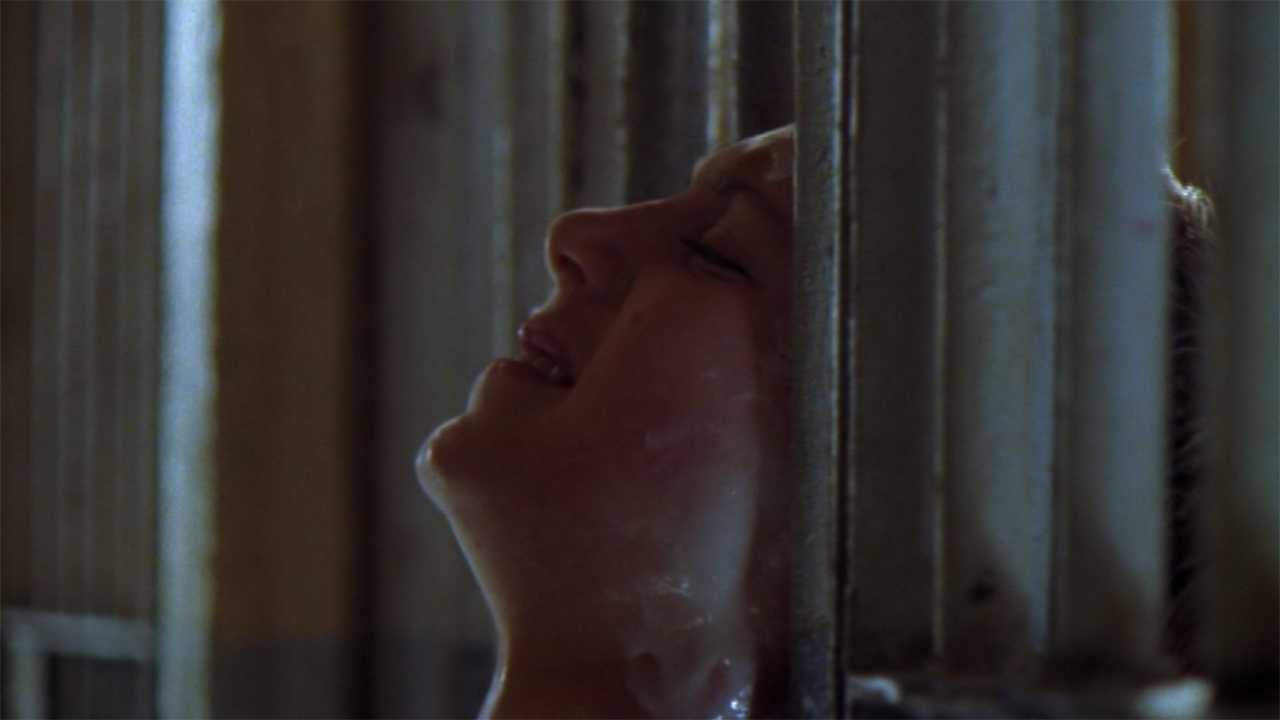
How Mick Garris’ Desperation Differs From Stephen King’s Book
Shocker incoming: when Stephen King adapts his own stories, the scripts he writes tend to be very faithful. He doesn’t typically add new characters or subplots or make any big swings; in fact, it’s typically the opposite, as his job usually requires streamlining what he had published. Case in point, Desperation very much reflects what can be discovered reading the 1996 novel, but it does execute some notable alterations and cuts.
The first big difference that stands out between the book and adaptation is the excision of a secondary antagonist. In King’s novel, Stephen Ames (played by Steven Weber in the TV movie) and Cynthia Smith (Kelly Overton) encounter a woman named Audrey Wyler, a mining engineer, before finding John Marinville (Tom Skeritt) and the other scared travelers in the local movie theater. At first she appears to be yet another victim of everything that is happening in Desperation, but eventually the group realizes that she is another vessel for Tak. She tries to kill David Carver (Shane Ashton Haboucha), who the evil entity recognizes as a specific threat (another detail not in the adaptation), but she is stopped by the group while attempting to strangle the boy, and is herself killed.
The reason Audrey is able to try and choke David is because the kid is in a trance at the time – which is another detail that is changed for the Mick Garris movie. In the teleplay, Stephen King includes a scene where David magically watches a film depicting the history of the China Pit and how Tak originally escaped, but that’s not what is in the book. Instead, David has a vision with a guide who turns out to be a young John, and we learn the story about how, following his best friend’s accident, David was told by God to go to his special hideout (called the “Viet Cong Lookout”) and leave an Excused Early pass he got from school.
Instead of David’s vision, the adaptation gives one to John – who hallucinates watching a movie about his time in Vietnam shortly after he tries to abandon the rest of the Desperation survivors. Through the “movie” it is suggested that John previously encountered Tak while it was possessing a Viet Cong soldier. He witnesses the evil entity planting a bomb in a bar filled with Americans, and runs out of the place without trying to save anybody before the device explodes.
These changes wind up influencing differences in the ending. In Stephen King’s novel, David finds the Excused Early pass from school in his pocket with a note from John citing the bible verse that says, “God is love.” Because the pass isn’t featured in the movie, the adaptation changes things up, and the Desperation survivors instead find a yearbook with John’s handwriting in the back of Mary Jackson’s (Annabeth Gish) car. It also has a photo featuring John with David’s deceased sister and the aforementioned bible verse in chalk.
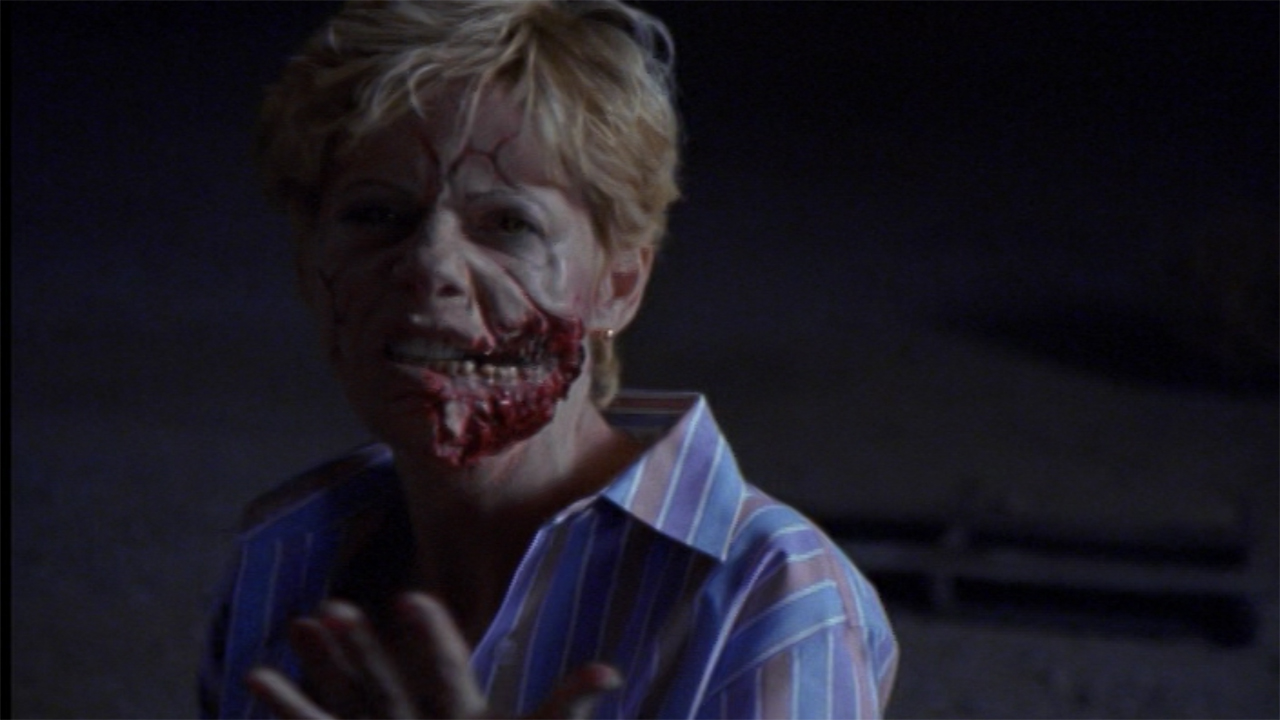
Is It Worthy Of The King?
In addition to being a meditation on God and a tale of terror in the desert, Desperation is also part of an interesting writing experiment for Stephen King. September 24, 1996 marked not only the release date for the author’s book, but it also saw the publication of The Regulators – the first novel credited to Richard Bachman (King’s nom-de-plume) in about 12 years. With the effort, King wished to try and tell two very different stories in two distinct voices featuring relatively the same cast of characters.
It’s a cool idea… but I can’t honestly say I have much love for either book. Without getting too deep into my feelings about The Regulators (I’ll have to wait for it to be adapted for that opportunity), Desperation is a novel that never got its hooks into me while I was reading it. As intriguing as I often find Stephen King’s theology-driven endeavors, the ensemble cast of characters isn’t as engaging as the ka-tets of the writer’s best work, and Tak is interesting in its pseudo-biology and behavior, but also lacks any kind of significant nuance that makes it stand out as a next-level evil.
These issues aren’t fixed via adaptation. Sure, we get to see all of the desert creepy-crawlies creep and crawl around for real – scary for someone with entomophobia/arachnophobia like myself – but all of the best character-based terror is in the first act when Collie Entragian (Ron Perlman) is pulling his victims over on the road. Once the supernatural elements come into play, it loses all of its energy.
Ron Perlman’s performance really is the primary reason to watch Desperation… and that’s kind of a problem when you consider that Tak uses up Collie as a vessel halfway through the movie, and he only appears in brief flashes in the final hour. It can be called a faithful and worthy adaptation, but that sentiment comes heavy with context.
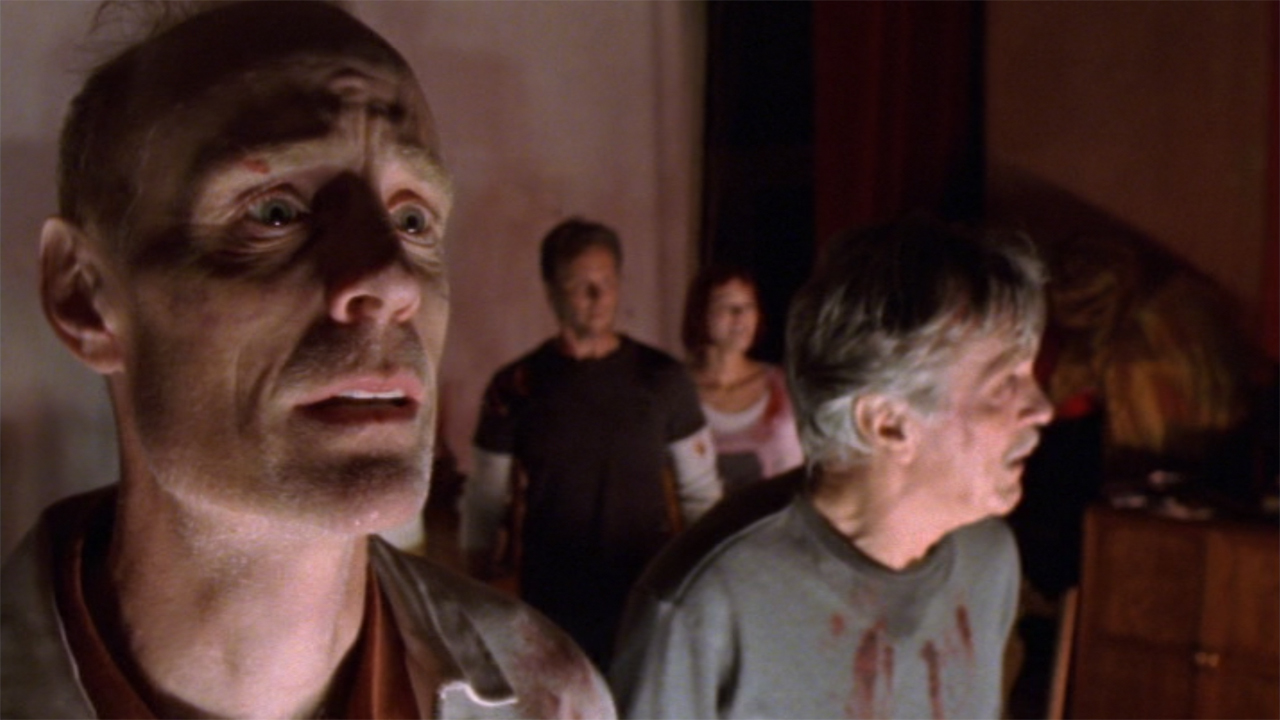
How To Watch Mick Garris’ Desperation
Those interested in checking out Mick Garris’ Desperation for themselves to make their own calls on the TV movie should have no issue finding a copy to watch. Physical media collectors have to settle for the DVD that was released shortly after the adaptation first aired (a Blu-ray has not yet been produced), but there are also plenty of digital options available. The 131-minute feature is not presently available on any of the major streaming subscription services, but you can either rent or purchase it online at major online retailers including Google Play, Apple TV, Vudu, and Amazon Video.
Coming up, I’ll next be heading to the year 2007 with Adapting Stephen King and examining John Cusack’s second King movie after Rob Reiner’s phenomenal Stand By Me: director Mikael Håfström’s haunted hotel room adventure 1408, based on the short story of the same name collected in the 2002 omnibus Everything’s Eventual. Look for the column in the CinemaBlend movie section next Wednesday, and for now discover all of the previous installments by clicking through the banners below.







Eric Eisenberg is the Assistant Managing Editor at CinemaBlend. After graduating Boston University and earning a bachelor’s degree in journalism, he took a part-time job as a staff writer for CinemaBlend, and after six months was offered the opportunity to move to Los Angeles and take on a newly created West Coast Editor position. Over a decade later, he's continuing to advance his interests and expertise. In addition to conducting filmmaker interviews and contributing to the news and feature content of the site, Eric also oversees the Movie Reviews section, writes the the weekend box office report (published Sundays), and is the site's resident Stephen King expert. He has two King-related columns.

